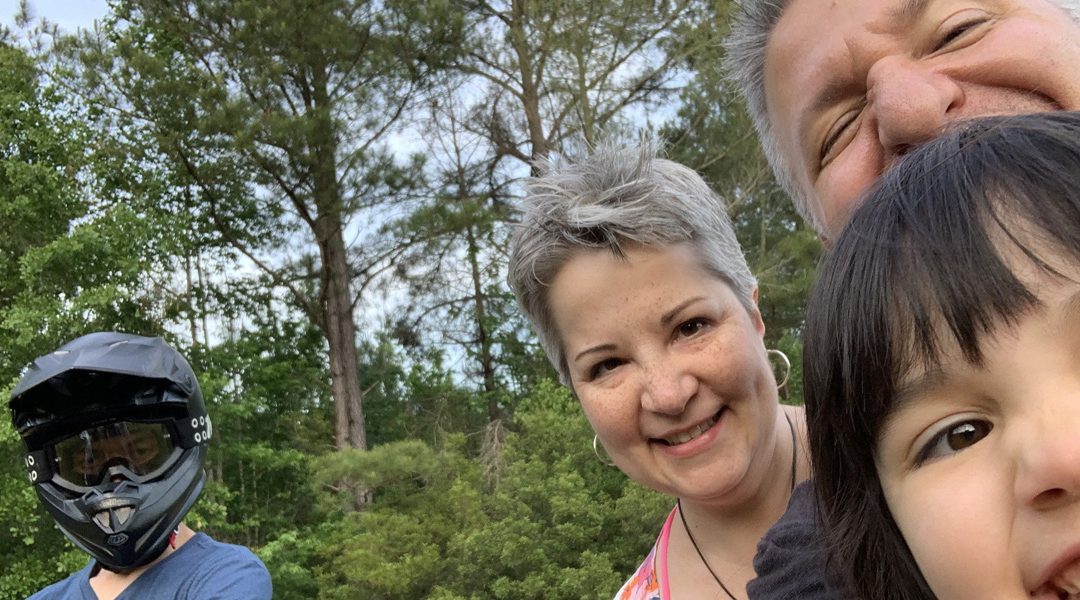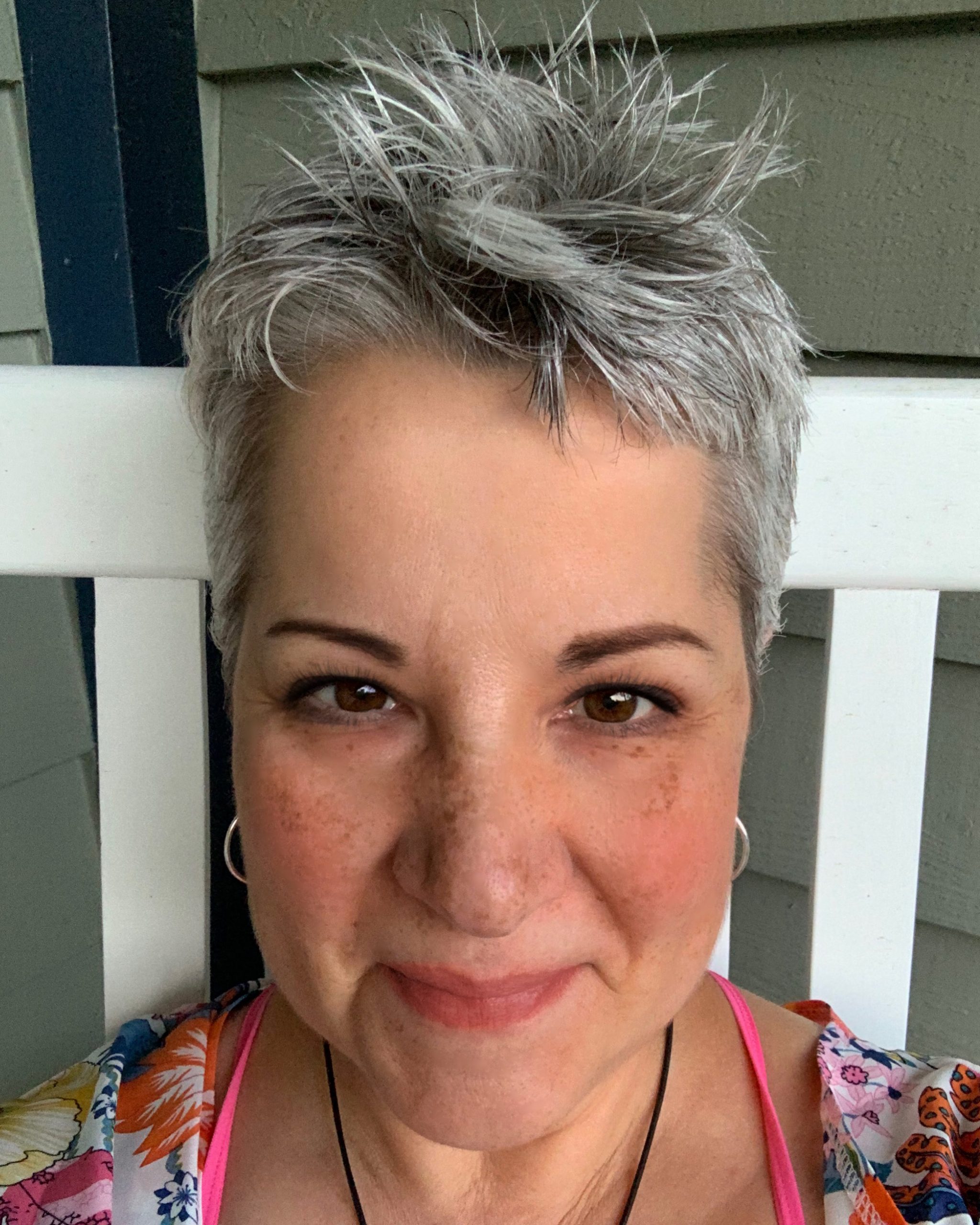Spring 2021/Natalie Vecchione
“I will praise You, for I am fearfully and wonderfully made; marvelous are Your works, and that my soul knows very well.” Psalm 139:14
My name is Natalie Vecchione, and I am blessed to be a treasure finder. Our family has been living in North Carolina for over four years. Three years ago, we moved into our funky farmhouse on a little under four acres in Johnston County. We are converting one of our detached workshops into a tiny house for our son so he can have interdependence. We have been blessed that the Lord built our family through adoption. We’ve been a homeschool family for seven years. Last fall, we began homeschooling our daughter, five-and-a-half years old, who has childhood absence epilepsy. Our eighteen-year-old son has a fetal alcohol spectrum disorder (FASD)/bipolar disorder and other diagnoses. In May 2020, he finished his homeschool journey. He is working part-time as a carpentry apprentice and also studying computer coding online, part-time. Although our son had many comorbid diagnoses, he did not receive his official diagnosis of fetal alcohol spectrum disorder (FASD) until he was almost fifteen years old. We began homeschooling seven years ago, before his diagnosis, while we were living in NY as an accommodation for our son’s multiple physical, developmental, and learning needs. We were weary and tired of hearing everything that our son couldn’t do, and we wanted to start focusing on what he could do. Our homeschooling adventure has been a challenging but exciting one, and both of our children (who are thirteen years apart in age—God’s orchestration!) have homeschooling paths that are unique and strength-based.
Often times, the world focuses on our children’s deficits and compares their development to their peers. Homeschooling allows us to work with their needs while giving us the opportunity to focus on their strengths. This is one of the many grace-based (and brain-based) foundations of parenting a child with a brain-based disability: to focus on the child’s strengths and to meet them where they are in order to accommodate their needs. I especially believe that as parents of children with brain-based diagnoses, we need to recognize that what we previously thought were bad behaviors are actually symptoms of the brain struggling to be accommodated. Furthermore, we are our children’s best advocates because we know our children best! We know that the world may see their needs and struggles, but we see their potential and talents. Our Heavenly Father has blessed us with the responsibility to find the treasures (or gifts) inside our children. “For we are His workmanship, created in Christ Jesus for good works, which God prepared beforehand that we should walk in them.” Ephesians 2:10
We always knew that our son loved to work with his hands and that he was very creative. When he was younger, he enjoyed hands-on science experiments, art projects, and building things. He also enjoyed outdoor activities, exploring nature, and physical activities like skateboarding, scootering, and lifting weights. We quickly embraced that our son was a kinesthetic learner. Throughout his homeschool journey, I learned how to accommodate in ways that would help strengthen his ability to learn and retain information. For example, we practiced and recited spelling words while he was riding his scooter, or we worked on math facts while he was bouncing on the trampoline. When he was sixteen, our son participated in a two-week carpentry camp (for teens with special needs) where he learned that he had a gift of carpentry and woodworking. After many phone calls and emails, I was blessed to find two amazing carpenters who saw the blessings that our son had to offer and took our son on as their apprentice. His last two years of homeschool were the best! In addition to completing his required subjects, he spent many hours in the woodshop (and in the field) learning his trade in the best way possible—hands-on. Our family also enjoyed the fruits of our son’s labor—cutting boards, bowls, custom-designed woodwork, keepsake boxes, and even a custom-made desk for our home office! Most importantly, we were blessed to be able to help our son grow in the gifts with which the Lord has blessed him!
Now, we have started our daughter’s homeschool, which will be unique and just as adventure-filled! We are blessed.
Before I share the final lessons that I’ve learned from our family’s homeschool journey (and my love for homeschooling children with unique needs), I’d like to share some facts and reasons why I became a parent advocate in the FASD community:
- Fetal alcohol spectrum disorder (FASD) is a lifelong disability that affects the brain and body of those individuals who were prenatally exposed to alcohol.
- FASD is the leading cause of developmental disabilities in the western world. Those who have FASD have a lower developmental age versus their chronological age.
- Primary characteristics of FASD include: poor working memory, executive functioning deficits, dysmaturity, impulsivity, distractibility, slower processing, inconsistent memory, difficulty with cause and effect, inability to make associations or think abstractly.
- A recent 2018 study, published in JAMA, by Phillip May, Ph.D. of UNC-Chapel Hill found that one in twenty first graders have FASD.
- No amount of alcohol is safe during pregnancy. Out of all of the drugs/substances to which an unborn child can be exposed, alcohol causes the most damage.
- Approximately 70% of children and teens in the US foster care system are impacted by FASD.
- FASD is a spectrum disorder. No two people with FASD have exactly the same set of symptoms. There are five diagnoses that fall under the FASD spectrum umbrella: fetal alcohol syndrome (FAS), partial fetal alcohol syndrome (PFAS), alcohol-related birth defect (ARBD), neurobehavioral disorder associated with prenatal alcohol exposure (ND-PAE), and alcohol-related neurodevelopmental disorder (ARND). FASD results in cognitive, behavioral, health, adaptive functioning, and learning challenges. There are over 400 comorbid medical and mental health diagnoses that can accompany having FASD.
- FASD is a brain-based disability with lifelong symptoms. It cannot be cured. A child or teen with FASD is not “misbehaving” or “being disobedient.” His or her brain cannot process what is being asked of him/her. It’s not that they won’t do something, they can’t.
- FASD is not limited to one population or demographic. It can happen to any unborn child exposed to any amount of alcohol.
- FASD is the most misdiagnosed, undiagnosed, and underdiagnosed of all developmental disabilities.
What have I learned as a Treasure Finder Homeschool Mom?
- We must meet our children where they are so that they can explore the gifts in them. We should learn their interests, support their interests, and nurture their growth.
- We shouldn’t focus on what our child can’t do, but rather, rejoice in what they can do!
- We should see our child the same way the Lord sees our child—as a gift, a blessing, and your teacher! I can honestly say that our son’s homeschool journey, especially the past few years, taught me numerous life lessons and strengthened my faith in so many ways!
- We should support our child—learn how we can accommodate and support his or her needs!
- We should recognize that every child, no matter the diagnosis or level of functioning, has treasures inside that we have the honor and blessing to discover. Once we discover our children’s gifts, we can nurture and support them so they can grow and thrive.
- We should recognize our role in our child’s life. On the days that we think we can’t do this (and I’ve had many of those!), let’s remember that the Lord has trusted us to be a Treasure Finder for our child. One of the many blessings of this unique journey is that we celebrate victories and milestones that are taken for granted by the rest of the world. We glorify Him when we discover the God-given potential inside our children.
- We are not alone on this challenging but blessed journey.
We realized that the Lord placed our family on this very unique journey to help others in the FASD community. Last fall, my husband and I were led by the Holy Spirit to start FASD Hope, a podcast/resource website to carry out our mission/ministry of increasing awareness of (FASD). We pray that we can be a resource to families and those in the FASD community.




